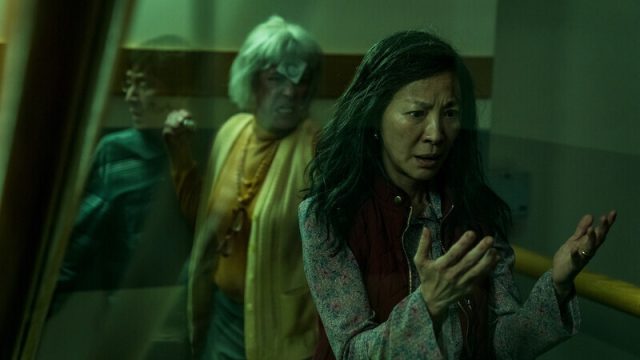This Week You Will Recognize:
- Michelle Yeoh
- Daniels
- Michael Douglas
- Superchunk
- The grime of the subway
- The long, open road
We also take a moment to recognize scb0212 and Miller for contributing this week. Send articles for inclusion throughout the next week to ploughmanplod [at] gmail, post articles from the past week below for discussion, and Have a Happy Friday!
As Everything Everywhere All at Once opens wider, Rolling Stone‘s David Fear sits down with Michelle Yeoh to talk about encountering the script for the first time, stunts, and her early career:
One thing that had caught Yeoh’s eye while she was on set, however, were the action sequences. The more she watched the stunt choreographers stage the knock-down, drag-out fight scenes that was a signature of a lot of Hong Kong cinema, the more she began to pick up on the rhythms behind every punch and kick. “It was like watching someone choreograph a dance,” she says. “I could hear the music underneath those scenes, you know — like bom, bom bom bom, bom bom bom, bom.” She hums an almost waltz-like tune, then begins moving her arms in a series of light blocks and jabs to the beat. “It was a revelation.”
And on the other side of the camera, rogerebert.com’s Nick Allen talks to the directing due Daniels about learning from their first film, working with the Russo Brothers and filming action:
Did the reception of “Swiss Army Man” influence that at all, that you guys want to be entertainers but also can have wild premises?
[Kwan]: 100%. It wasn’t that we wanted to be entertainers, we wanted to prove that the profound and the profane belong to each other. As above, so below. That’s what “Swiss Army Man” was trying to do, and we got a decent amount of people in, which is such a success in our books. We got some people to say, “This is our favorite movie ever,” what a miracle because it’s a farting corpse drama, you know? But for the haters, who just didn’t get it, who full-on rejected it, I felt like we failed them. I was like, “I’m so sorry we didn’t show you the truth.” The dung beetles, they’re rolling in their shit, but they also look to the stars to guide them.
[Scheinert]: WHAT! What a headline! Or a bumper sticker.
For CrimeReads, Olivia Rutigliano celebrates the three stars of 1976’s The Taking of Pelham One Two Three – Walter Matthau, Robert Shaw, and the New York City subway system:
But it’s mostly because film captures that unique, ineffable aura of the New York City subway system, an aura that has apparently defined it through these many years. In The Taking of Pelham One Two Three, the subway is cumbersome, inefficient, inconvenient; it is dirty, dilapidated, and neglected; it is stressful, exhausting, and dangerous. The Taking of Pelham One Two Three represents the subway for what it truly is: a paradox, a massive and sophisticated public transportation network in a famous city, in charge of carrying millions of people to their destinations every day, pathetically held together by rust and the strenuous labor of a handful of beleaguered—and no doubt severely ulcerated—civil servants.
At Vulture, Bilge Ebiri investigates how and why Michael Douglas became the go-to guy for erotic thrillers:
With that anxious downturn to his mouth, that too sharp chin, and those hungry, watchful eyes, he could express just about anything with a minimum of effort. He could be convincingly cocky, confident, brilliant, ordinary, awkward, lost, pathetic, silly, extreme, mild, or idiotic, all while essentially remaining himself. These impulses played out in layers across his face. Peel back one layer and you could see a slightly aging version of an ’80s yuppie (this was, after all, the man who won a Best Actor Oscar for playing Wall Street’s Gordon Gekko). Peel back another and you could see a recovering hippie (which Douglas had been in his youth). Peel back one more and there was Old Hollywood staring back at you in the physical echoes of his movie-star father, Kirk. (You could also hear it in his voice, Kirk’s distinctive tough-guy cadences sneaking through Michael’s reedier delivery.)
Craig Morgan Teicher writes for The New Yorker about listening to Superchunk’s latest album and navigating aging along with the band:
It’s an archetypal Superchunk song, happy and sad at once, straining against the limits of its uncomplicated materials, earnest about its irony, which isn’t an affect but a simple fact—the opposite of what should be true is true, and it sucks. Life has been full of that kind of irony recently, yet, of course, we must accept, manage, believe, and bear it all, because what else are we going to do? The lyrics of “Wild Loneliness” are peppered with the nouns of my pandemic, the “nonsense and banana bread” that’s kept our house flickeringly lit through this time.
In Stereogum, Zach Schonfield surveys the response to up-and-coming band Wednesday’s bleak breakdown of touring finances:
The responses to Wednesday, meanwhile, provided a revealing — if bleak — glimpse into a lack of solidarity from many music fans, some of whom seem to expect that touring bands forgo any semblance of dignity or comfort just to break even on the road. “It comes down to looking at artists as products and not people making art to share. And also, not looking at artists as workers,” [musician Ella] Williams says. “And it comes down to people in bands that do it completely differently, who don’t really understand the vibe of long-haul touring. It’s not a sprint. It’s not a two-week-long party to get drunk every night and crash on people’s floors. You’re on the road for several months and it’s important to conserve any energy that you can.”

